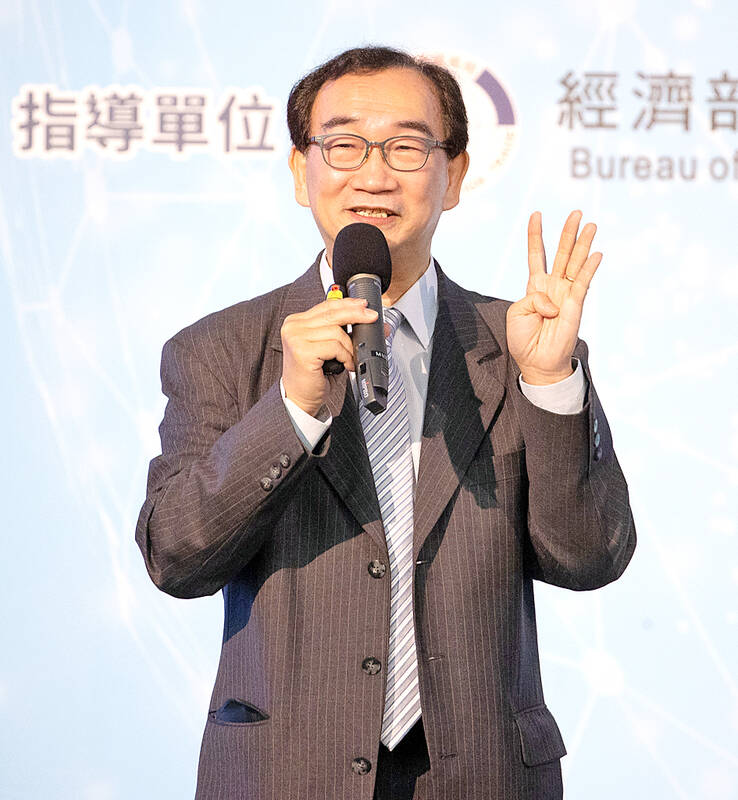Taiwan’s long-term strategy for strengthening its economy should be to broaden the application of semiconductors and to upgrade its service sector, Chung-Hua Institution for Economic Research vice president Wang Jiann-chyuan (王健全) said at a seminar in Taipei on Saturday.
Taiwan’s good economic performance between 2019 and last year was largely due to three factors: the surge in demand for electronic devices during the COVID-19 pandemic, the US-China trade war, which made customers transfer their orders to Taiwan, and the rise of artificial intelligence (AI), 5G and electric vehicles, Wang said.
During the past three years, the economy grew by an average of about 3.5 percent, with an increase of US$7,000 in GDP per capita, he said. However, a “winner’s curse” took hold from the latter half of last year, when the end of the pandemic reduced the need for electronics and Taiwanese companies’ inventories piled up, Wang said.

Photo: CNA
“[In the latter half of 2022], for example, Quanta Computer Inc (廣達) said it had US$250 billion worth of inventory, Acer Inc (宏碁) said it had US$200 billion, while the pressure on Taiwan Semiconductor Manufacturing Co’s (台積電) inventory is also expected to continue until the end of this year or the beginning of next year,” he said.
Making matters worse is that the world’s two biggest economies have stopped providing economic growth spillovers.
The US, with a high interest rate of 5.25 percent that is unfavorable for investment, is only seeing strong performance in the service industry, such as entertainment, but no promising figures for durable goods such as laptops and electronic appliances — which Taiwan and other Asian countries rely on for exports, Wang said.
China is also facing an economic predicament caused by its real-estate bubble and enormous government debts, and it has not been able to roll out expansionary fiscal policies such as increasing government spending, he added.
Wang said as Taiwan’s economic growth this year has mainly relied on private consumption, the prospects for the country’s exports next year are also somewhat dire.
“Can AI stimulate the whole high-tech industry and benefit Taiwan’s semiconductor industry?” Wang asked, giving a negative answer. “Until AI can be applied in various areas [highly relevant to people’s everyday needs] such as retail, medicine, commerce, automobiles, etc. and generate new business models, it would be hard for the high-tech industry to rely solely on it.”
He said Taiwan’s semiconductor exports have in recent years come to account for 37 to 40 percent of its total exports.
“In 2021 Taiwan’s trade surplus in semiconductors was US$74 billion, but the total trade surplus was about US$60 billion, meaning that without semiconductors, other industries were in a trade deficit,” Wang said.
Considering its significance to the country’s economy, the economist called on the government to continue and enhance its lobbying strategies so that other countries do not see Taiwan and its companies as a threat.
“Samsung Electronics Co has more than a hundred lobbyists in the US,” he said, referring to a South Korean firm.
There is also the need to explore not only the upstream (raw materials, IC design) and downstream (packaging, testing and equipment) of the semiconductor industry, as the horizontal expansion of the application to various sectors — such as smart manufacturing, agriculture, medical equipment and electrification of vehicles — is also imperative, Wang said.
He urged the government to relax restrictions on the service sector, citing as examples the need to increase long-term care services, medical services, financial services, bilingual education and urban renewal.
“Taiwan has a high excess savings rate [defined as gross savings in excess of gross investment],” Wang said.
According to the Executive Yuan, the rate was 14.8 percent last year, much higher than South Korea’s (1.8 percent) and Japan’s (2.1 percent).
“While they save a lot, they invest a lot as well,” Wang said.
If new investment opportunities can be opened up in the service sector, more highly paid jobs could be provided to young people and the money would not simply flow into the real-estate sector, he said.
Green transition, digitalization and automatization are also sectors that could boost domestic investment, he added.

Jensen Huang (黃仁勳), founder and CEO of US-based artificial intelligence chip designer Nvidia Corp and Taiwan Semiconductor Manufacturing Co (TSMC, 台積電) on Friday celebrated the first Nvidia Blackwell wafer produced on US soil. Huang visited TSMC’s advanced wafer fab in the US state of Arizona and joined the Taiwanese chipmaker’s executives to witness the efforts to “build the infrastructure that powers the world’s AI factories, right here in America,” Nvidia said in a statement. At the event, Huang joined Y.L. Wang (王英郎), vice president of operations at TSMC, in signing their names on the Blackwell wafer to

AI BOOST: Although Taiwan’s reliance on Chinese rare earth elements is limited, it could face indirect impacts from supply issues and price volatility, an economist said DBS Bank Ltd (星展銀行) has sharply raised its forecast for Taiwan’s economic growth this year to 5.6 percent, citing stronger-than-expected exports and investment linked to artificial intelligence (AI), as it said that the current momentum could peak soon. The acceleration of the global AI race has fueled a surge in Taiwan’s AI-related capital spending and exports of information and communications technology (ICT) products, which have been key drivers of growth this year. “We have revised our GDP forecast for Taiwan upward to 5.6 percent from 4 percent, an upgrade that mainly reflects stronger-than-expected AI-related exports and investment in the third

RARE EARTHS: The call between the US Treasury Secretary and his Chinese counterpart came as Washington sought to rally G7 partners in response to China’s export controls China and the US on Saturday agreed to conduct another round of trade negotiations in the coming week, as the world’s two biggest economies seek to avoid another damaging tit-for-tat tariff battle. Beijing last week announced sweeping controls on the critical rare earths industry, prompting US President Donald Trump to threaten 100 percent tariffs on imports from China in retaliation. Trump had also threatened to cancel his expected meeting with Chinese President Xi Jinping (習近平) in South Korea later this month on the sidelines of the APEC summit. In the latest indication of efforts to resolve their dispute, Chinese state media reported that

CHINESE EXPORT CURBS: A dispute between China and the Netherlands could halt chip supply, affecting vehicle production, US and European auto associations said Groups representing major automakers late on Thursday warned that a chip disruption stemming from a dispute between China and the Dutch government could quickly affect US auto production. Automakers and their suppliers received notice from chipmaker Nexperia (安世半導體) last week that it could no longer guarantee delivery of its chips, the European Automobile Manufacturers Association said, adding that manufacturing could be significantly disrupted. In the US, the Alliance for Automotive Innovation, which represents General Motors, Toyota, Ford, Volkswagen, Hyundai and nearly all other major automakers, urged a quick resolution. “If the shipment of automotive chips doesn’t resume — quickly — it’s going to